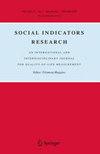Values in Crisis: Societal Value Change under Existential Insecurity
IF 2.8
2区 社会学
Q1 SOCIAL SCIENCES, INTERDISCIPLINARY
引用次数: 0
Abstract
Abstract The COVID-19 pandemic has had a profound impact on societies, with possible consequences for their fundamental values. Inglehart’s revised modernization theory links societal values to the underlying subjective sense of existential security in a given society (scarcity hypothesis), while also claiming that influences on values diminish once individuals reach adulthood (socialization hypothesis). An acute existential crisis such as the COVID-19 pandemic offers a rare opportunity to test these assumptions. We analyze data from representative surveys conducted in Japan shortly before and after the onset of the pandemic. Remaining survey sample differences are statistically controlled via propensity score weighting and regression adjustment, while post-stratification weights allow conclusions about the Japanese population. In three sets of analyses, we reveal that the pandemic and the experienced psychological distress are negatively associated with emancipative and secular values, entailing a reversal to traditionalism, intolerance, and religiosity. First, we document a substantial decline in both emancipative and secular values in the first months of the pandemic compared to five months earlier. This decline remained stable a year later. Second, we find that value change was stronger in prefectures more severely affected by the pandemic. Third, individuals who experienced higher psychological distress emphasized the same values more strongly, as evident in two surveys from May 2020 and April 2021. In contrast to the socialization hypothesis, our study provides evidence that, under extraordinary environmental conditions, values can shift even within a negligibly short time period.

危机中的价值观:存在不安全感下的社会价值变迁
2019冠状病毒病大流行对社会产生了深远影响,可能对人类的基本价值观产生影响。Inglehart修正的现代化理论将社会价值观与特定社会中存在的潜在主观安全感(稀缺假设)联系起来,同时也声称一旦个人成年(社会化假设),对价值观的影响就会减弱。COVID-19大流行等严重的生存危机为检验这些假设提供了难得的机会。我们分析了在大流行发生前后不久在日本进行的具有代表性的调查的数据。剩余的调查样本差异通过倾向得分加权和回归调整在统计上得到控制,而分层后的加权可以得出关于日本人口的结论。在三组分析中,我们揭示了大流行病和所经历的心理痛苦与解放和世俗价值观呈负相关,导致传统主义、不宽容和宗教信仰的逆转。首先,我们记录到,与5个月前相比,在大流行的头几个月里,解放和世俗价值观都大幅下降。一年后,这种下降保持稳定。其次,我们发现受疫情影响更严重的县的价值变化更大。第三,从2020年5月和2021年4月的两项调查中可以看出,经历过更高心理困扰的个体更强烈地强调了同样的价值观。与社会化假说相反,我们的研究提供的证据表明,在特殊的环境条件下,价值观甚至可以在微不足道的短时间内发生变化。
本文章由计算机程序翻译,如有差异,请以英文原文为准。
求助全文
约1分钟内获得全文
求助全文
来源期刊

Social Indicators Research
Multiple-
CiteScore
6.30
自引率
6.50%
发文量
174
期刊介绍:
Since its foundation in 1974, Social Indicators Research has become the leading journal on problems related to the measurement of all aspects of the quality of life. The journal continues to publish results of research on all aspects of the quality of life and includes studies that reflect developments in the field. It devotes special attention to studies on such topics as sustainability of quality of life, sustainable development, and the relationship between quality of life and sustainability. The topics represented in the journal cover and involve a variety of segmentations, such as social groups, spatial and temporal coordinates, population composition, and life domains. The journal presents empirical, philosophical and methodological studies that cover the entire spectrum of society and are devoted to giving evidences through indicators. It considers indicators in their different typologies, and gives special attention to indicators that are able to meet the need of understanding social realities and phenomena that are increasingly more complex, interrelated, interacted and dynamical. In addition, it presents studies aimed at defining new approaches in constructing indicators.
 求助内容:
求助内容: 应助结果提醒方式:
应助结果提醒方式:


